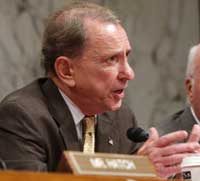| Home | Blog | Ask This | Showcase | Commentary | Comments | About Us | Contributors | Contact Us |

Specter’s ‘compromise’ limits judicial review and opens a Pandora’s BoxASK THIS | August 233, 2006Civil libertarian Kate Martin thinks that instead of giving away the store on domestic surveillance, Senator Arlen Specter should be asking the government for some answers. By Kate Martin Last month, Senate Judiciary Committee Chairman Arlen Specter (R-Pa.) announced a "compromise" proposal related to the National Security Agency’s warrantless surveillance program: President Bush would agree to voluntarily submit the program for review to the Foreign Intelligence Surveillance Court, and would support proposed legislation (Senate Bill 2453) amending the Foreign Intelligence Surveillance Act. Q. Does the Specter/White House bill provide for greater judicial review than currently exists? Or would it cut back existing avenues of review and stack the cards in the government’s favor? Q. Why does the Specter/White House bill authorize much broader surveillance of Americans’ communications than the surveillance thus far acknowledged by the President? Is that because such a program already exists? Or because the administration is planning to institute dragnet surveillance of all communications coming in or out of the country? Q. How many innocent Americans have been overheard on warrantless surveillance, who were not talking to terrorists? Judicial Review There are already more than a dozen pending cases challenging the NSA surveillance program, some brought by criminal defendants who may have been overheard on such surveillance, others by civil liberties organizations against the government and the telephone companies. The government is seeking dismissal of all the challenges on the grounds of state secrets privilege. But at least two judges, one in San Francisco and one in Detroit have rejected the state secrets privilege. In an August 17 ruling, U.S. District Court Judge Anna Diggs Taylor in Detroit found the program both illegal and unconstitutional, though she allowed the program to remain in force for the moment. And the government is also appealing a California judge’s ruling that the case against the telephone companies can go forward, despite the claim of privilege. The issue is therefore on course to be decided by the U.S. Courts of Appeals and Supreme Court – unless of course, Congress derails that review. However, rather than encouraging judicial review of the program, the Specter/White House bill instead seeks to transfer all the challenges to one court, which happens to be the most likely to rule in favor of the government. Contrary to some reports, the Foreign Intelligence Surveillance Court of Review likely would hear arguments in an adversarial setting – so the proceedings wouldn’t be entirely one-sided. Nevertheless, the Foreign Intelligence Surveillance Court of Review is an ideal venue for the government as it is the only appeals court that has already made statements favorable to the government. (In 2002, when the government was secretly violating the FISA, it made a general argument for broad presidential authority and in its ruling in that unrelated case the court obligingly included a sentence about presidential power which the Justice Department now relies on in arguing that the President has the constitutional authority to ignore FISA.) If Specter really wanted to provide for judicial review, he could facilitate those pending cases by requiring the disclosure of basic facts relevant to the review, e.g., what legal rationale did the government give to the telephone companies to secure their cooperation. The Specter-White House bill would further stack the cards for the President by retroactively amending the FISA and gutting its prohibition on warrantless wiretapping. The bill would replace FISA’s carefully constructed checks and balances with a blank check to the President. Warrantless Surveillance of Millions? The President claims that the surveillance program at issue is limited to domestic-overseas conversations where NSA officials determine that there is probable cause that one party is Al Qaeda or involved with Al Qaeda. But the Specter bill would authorize the NSA to seize the contents of millions of domestic-overseas communications by millions of Americans. There would be no requirement of any individualized judicial determination that there is probable cause of terrorist connections or any wrong-doing by any of the individuals being listened to. Such surveillance programs would not even be limited to counterterrorism efforts, but would be authorized for extremely broad “foreign intelligence” purposes. While CIA Director Michael Hayden has denied the existence of a “driftnet,” this legislation would in fact authorize such non-targeted surveillance. The NSA, for example, could seize all communications between New York and Lebanon and permanently store them in government databases to be data-mined at the request of the White House or any other agency. Indeed, two other bills introduced by Republicans would also authorize such warrantless surveillance of millions of electronic communications by Americans: S. 2455 introduced by Senator DeWine, and H.R. 5825, introduced by Rep. Heather Wilson. The press should find out why the administration and its congressional supporters are seeking congressional authorization for a much broader program of warrantless wiretapping of phone calls and e-mails than the President has admitted exists. And the press should pin the administration down as to why any necessary surveillance of suspected terrorists cannot be conducted with a secret FISA warrant issued by the FISA court, when Senator Feinstein, who has been briefed on the program says that it can. The Scope The American public has a right to know at a minimum roughly how many innocent Americans have been overheard. This information would not disclose anything helpful to the terrorists. The president has implied that the number is zero, but administration officials have refused to be explicit. Congress should insist on public disclosure of the range, whether the answer is less than 10 or more than 10,000 for example.
|




